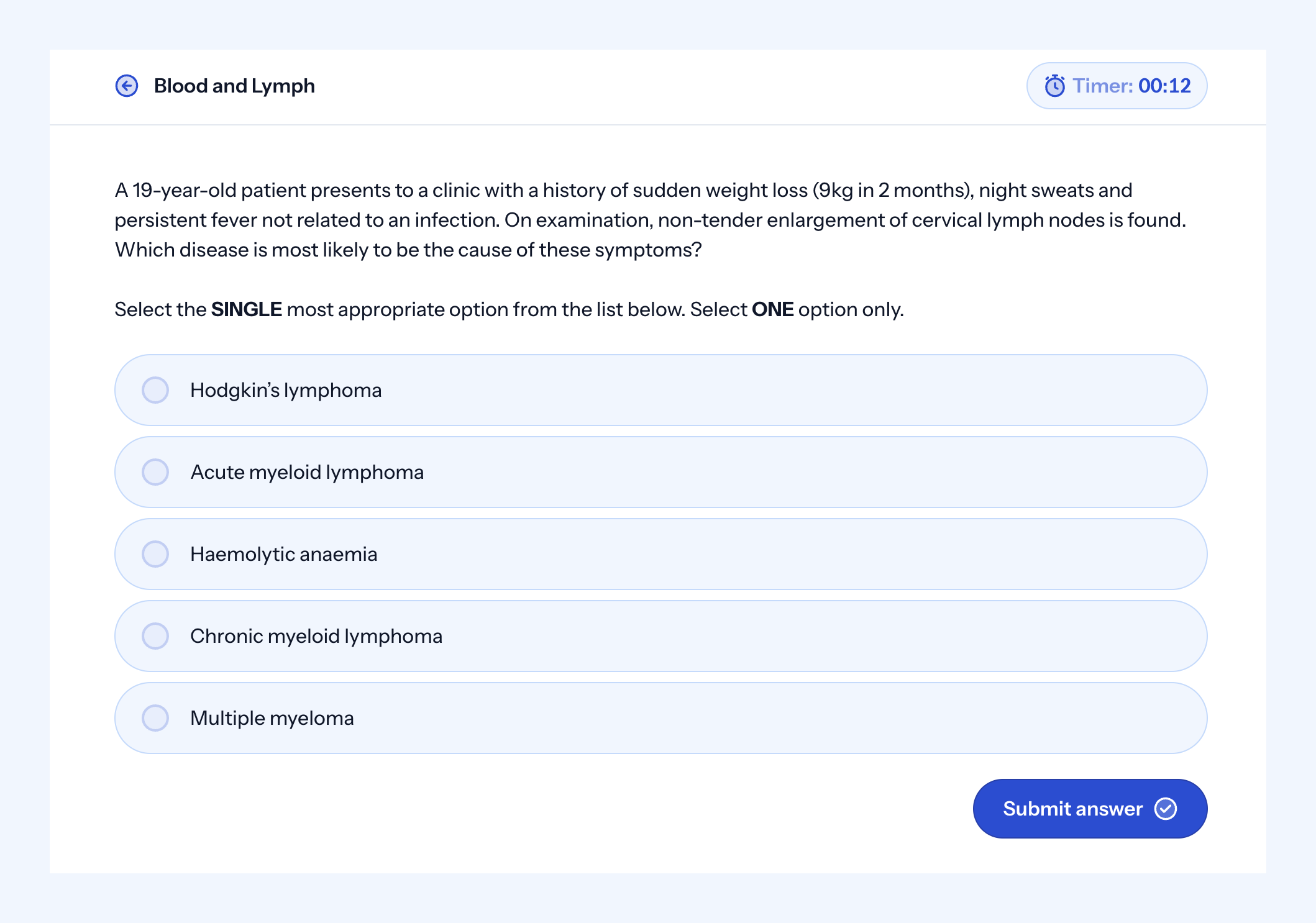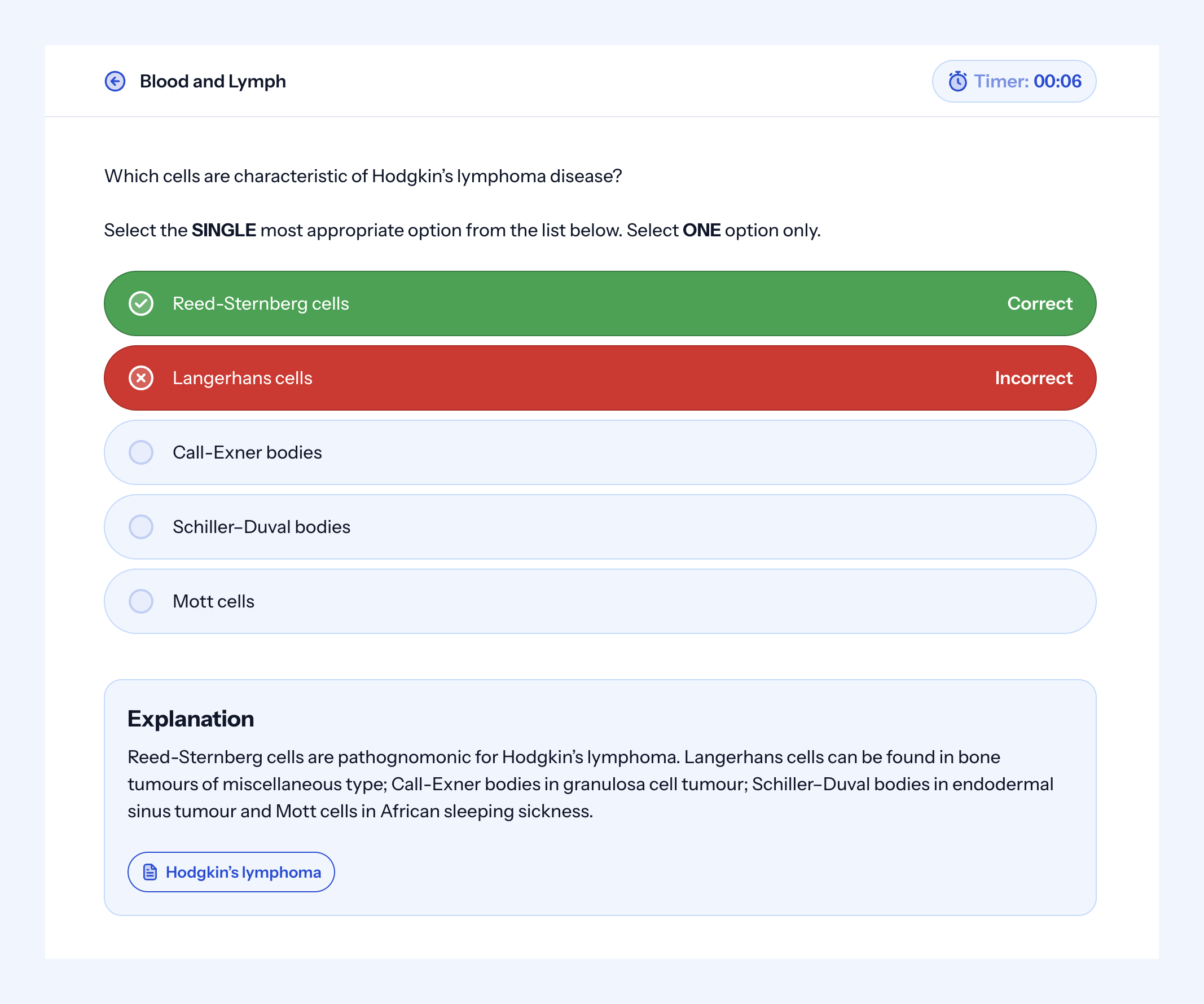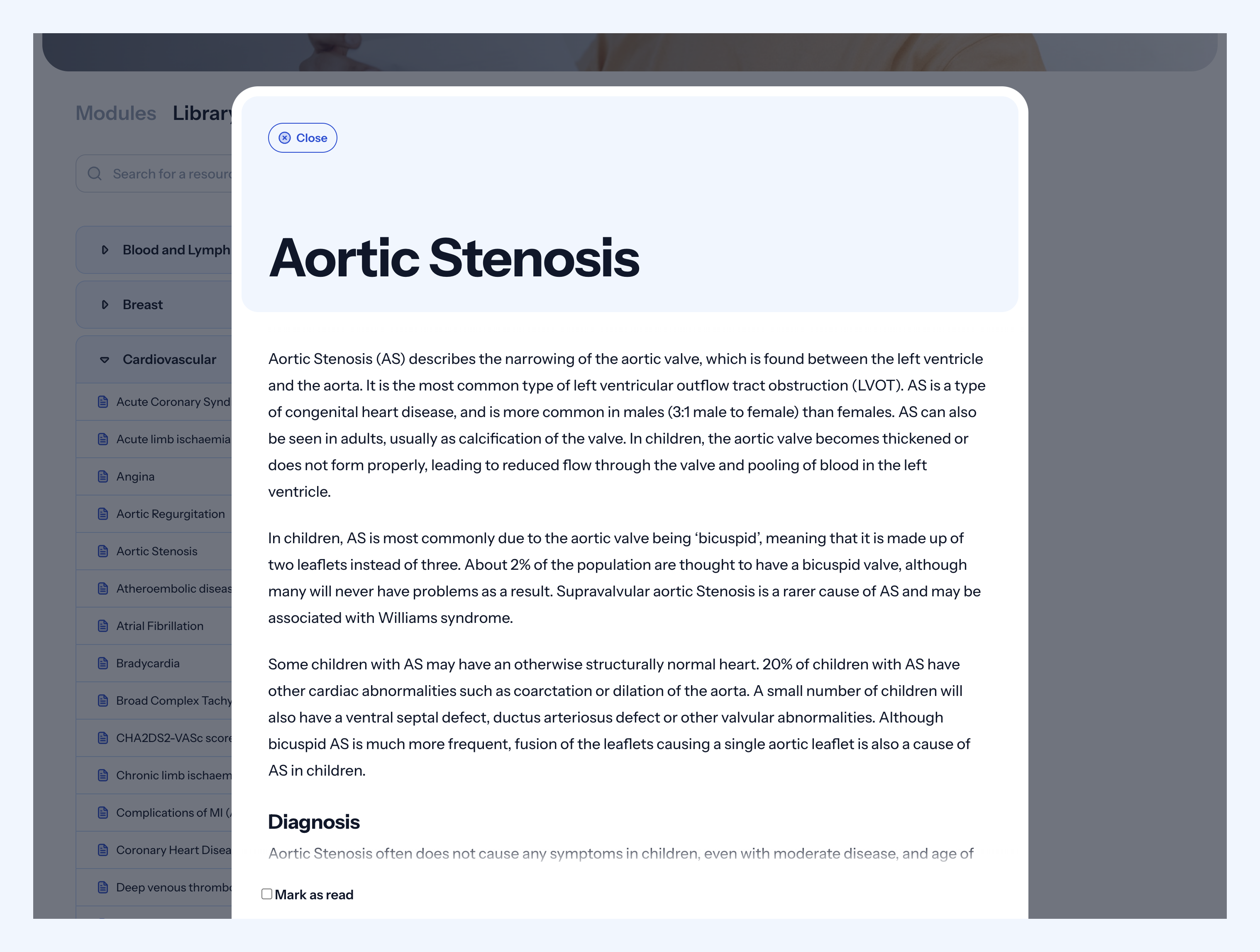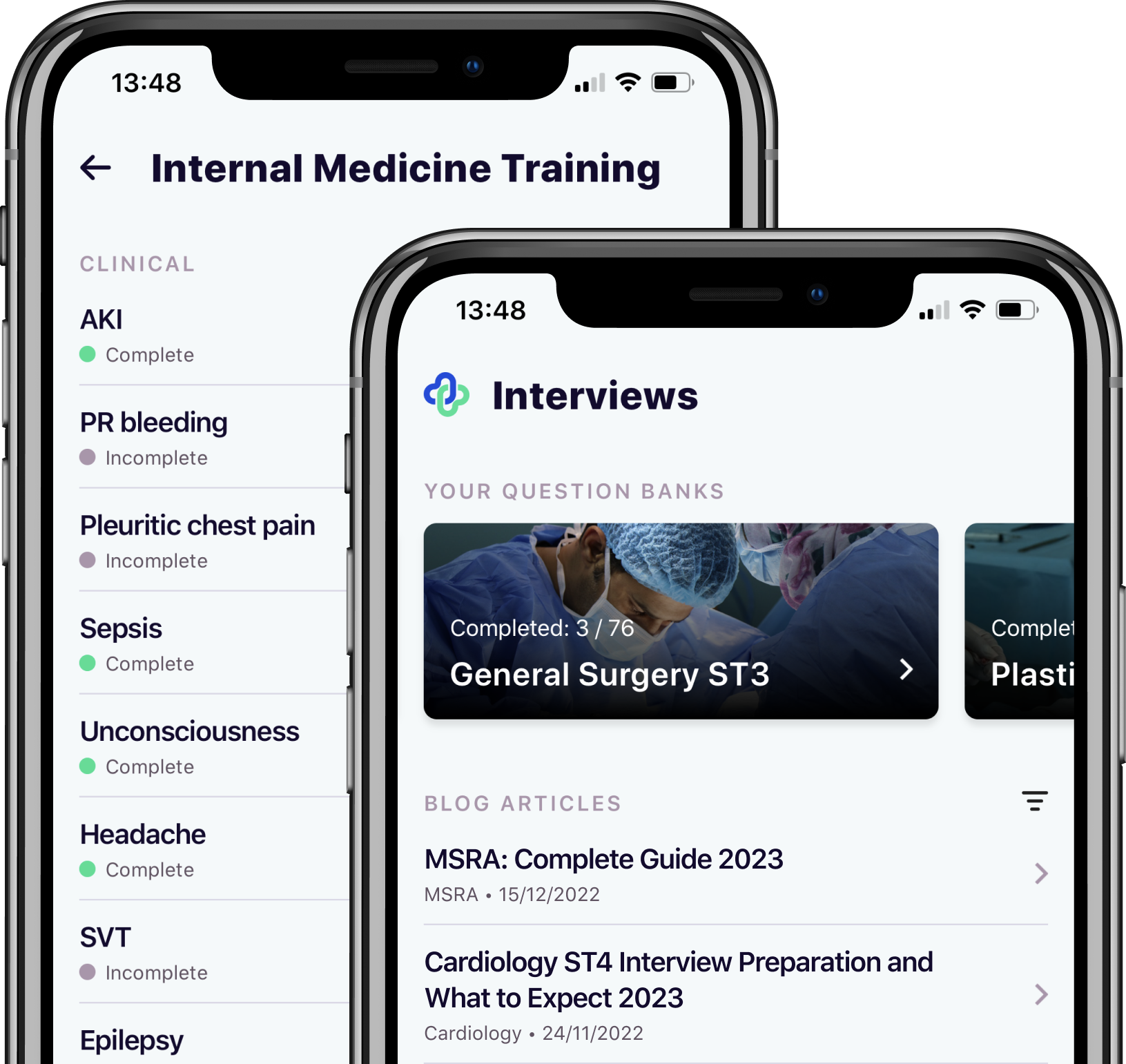
PLAB Guide 2025
If you’re planning to register to practise medicine in the UK and are required to carry out the Professional and Linguistic Assessments Board (PLAB) test, our comprehensive PLAB guide will provide you with key information about the exam, including what to expect, key dates for 2025 and how to prepare.
All doctors who practise medicine in the UK must be registered with the General Medical Council (GMC) and have a licence to practise; for the majority of international medical graduates, the application process will include a PLAB test. The exam is designed to ensure that doctors who qualified outside of the UK have the relevant knowledge and skills to practise medicine within the UK.
The PLAB exams are now based on the MLA content map rather than the PLAB blueprint, as it has been previously. This change took place from these dates onwards:
- PLAB 1: all tests sat on or after 8 August 2024 will be based on the MLA content map
- PLAB 2: all tests sat on or after 17 May 2024 will be based on the MLA content map
Therefore, you should prepare for your exam using a question bank that is built around the MLA content map. If you are using a PLAB question bank, this will mostly likely be based on the PLAB blueprint and therefore not tailored to the exam you will take. You can find out more in the section below.
Is the MLA replacing the PLAB?
The Medical Licensing Assessment (MLA) is a new GMC assessment intended to provide a common and consistent assessment of safe practice for all doctors registered to practise in the UK.
From the academic year 2024-25 onwards, medical students graduating from UK universities will need to pass the MLA as part of their degree before they can join the medical register.
For international doctors required to take the PLAB as part of the registration process for joining the UK medical register, you will continue to do so, and you will not take the MLA. However, when the PLAB becomes compliant with the requirements of the MLA, both UK medical graduates and international medical graduates applying to practice in the UK will take assessments that draw from the same topics and meet the same requirements.
The MLA content map outlines the core knowledge, skills and behaviours needed for UK practice. As mentioned above, this change ensured that the PLAB is compliant with the MLA requirements and that consistent standards for the assessment of UK-registered doctors are being met. Remember, it’s best to use a question bank that’s based on the MLA content map if your exam is affected. You can find out more about the MLA content map in our MLA Guide.
To learn more about how the introduction of the MLA will affect the PLAB, visit our PLAB and MLA Guide.
Which countries accept PLAB?
The PLAB is the GMC’s method of assessing the knowledge and skills required for practising medicine within the UK. It is used as evidence for applicants who don’t hold a UK or ‘relevant European qualification’. There are some exceptions, which you can find here, but generally, if you qualified outside of the UK and don’t hold a ‘relevant European qualification’, you will be required to undertake the PLAB test as part of your GMC registration.
PLAB exam pattern
The PLAB test is divided into two parts – PLAB 1 and PLAB 2 – which you’ll undertake separately. The following section has more information on what is involved in each exam.
You must pass both parts of the PLAB test to be able to apply for registration with a licence to practise medicine in the UK.
PLAB exam steps and length
The following is an overview of the two parts of the PLAB test:
PLAB 1
- PLAB 1 is a written multiple-choice exam.
- Exam duration: 3 hours.
- Number of questions: 180 ‘single best answer’ multiple choice questions.
- Structure: For each one, you’ll be provided with a short scenario, followed by a question and five possible answers. You can see an example of a question from our question bank below.

Example of a PLAB question
You can learn more about what PLAB 1 entails and how to prepare effectively in our PLAB 1 guide.
PLAB 2
- PLAB 2 is a practical objective structured clinical exam (OSCE).
- Exam duration: Each scenario lasts 8 minutes. The total time, accounting for the time between the scenarios, isn’t specified by the GMC.
- Number of questions: 16 scenarios.
- Structure: Each scenario aims to reflect real-life settings. This may include a mock consultation or an acute ward.
The GMC provides further guidance regarding the PLAB 1 and PLAB 2 tests. You’ll also find more information in our ‘PLAB Pathway/Route’ blog.
Exam requirements
Before you can book your PLAB test, you must provide the GMC with the additional evidence required for your registration, including evidence of your medical qualification and knowledge of English. You can find more information about the evidence requirements for your registration here.
Once you’ve provided these, you’ll be able to book your PLAB 1 test; you’re not able to book the second part of the exam, PLAB 2, until you’ve received your results for PLAB 1.
PLAB dates
PLAB 1
The GMC offers PLAB 1 exams four times throughout the year, both within the UK and at a number of overseas locations.
The most recent and upcoming PLAB 1 exam dates are:
| Exam date | UK closing date |
|---|---|
| 20 February 2025 | 3 April 2025 by 4pm |
| 22 May 2025 | 3 July 2025 by 4pm |
| 7 August 2025 | 18 September 2025 by 4pm |
To find available places and test locations, you need to register for a GMC online account. You can find more information about ‘when and where you can take PLAB 1’, including overseas test locations, here.
The Medibuddy PLAB 1 question bank has several subscription options that vary in price depending on the length of the subscription, so you can pick the most suitable one for you and your test date.
Once you’ve picked your exam date, you should plan your revision. Almost 50% of people fail first time, and the main reasons for this are not starting revision early enough and not revising efficiently. Our adaptive PLAB 1 question bank uses sophisticated artificial intelligence algorithms to maximise the efficiency of your revision and help you pass the first time by ensuring that every question you answer will help improve your score.
PLAB 2
The GMC offers PLAB 2 tests throughout the year at their two clinical assessment centres in Manchester. As with the PLAB 1 test, you can view available places and book your test through your GMC online account; remember, you’re not able to do this until you’ve received your PLAB 1 results.
Demand for PLAB 2 places is high, so you may not be able to book an exam as soon as you’d like. However, if you have a UK job offer in the NHS which requires GMC registration or hold UK refugee status, you may be offered an exam sooner. You can find out more on the GMC website here.
PLAB cost
The following are the test fees for the PLAB exams, as provided by the GMC:
| PLAB test fees | Bookings from 1 April 2025 |
|---|---|
| Part 1 of the PLAB test (PLAB 1) | £273 |
| Part 2 of the PLAB test (PLAB 2) | £998 |
The test fees are really expensive, so we have kept the price of our PLAB 1 adaptive question bank as low as possible. What’s more, you are far less likely to fail using an adaptive question bank for revision, so you are less likely to have to pay to re-sit.
The GMC also provides the following information relating to cancellation fees:
| PLAB test cancellation fees | Bookings from 1 April 2025 |
|---|---|
| PLAB 1 – cancellations over 42 days before exam | £27.30 |
| PLAB 1 – cancellations less than 42 days before exam | £273 |
| PLAB 2 – cancellations over 42 days before exam | £99.80 |
| PLAB 2 – cancellations between 42 and 28 days before exam | £499 |
| PLAB 2 – cancellations less than 28 days before exam | £998 |
Exam syllabus
To help you understand the PLAB syllabus, the GMC provides an MLA content map that details the knowledge, skills and behaviours you’ll be expected to demonstrate during the exam. The blueprint provides a knowledge section outlining what will be tested, and a domains section, which links to the GMC’s core guidance, good medical practice.
The GMC states that the MLA content map is mapped against the following documents, which you may find useful to explore further:
- Good medical practice – the GMC’s core guidance which all registered doctors must adhere to. You must be able to demonstrate the values and behaviours set out in this document during your PLAB exam and your practice in the UK.
- Outcomes for provisionally registered doctors – these are the outcomes doctors must meet following completion of their first year of Foundation Programme training to be able to apply for full registration with a licence to practise.
- The UK Foundation Programme curriculum – this is the framework which is used in the UK to support the first two years of educational training for doctors.
To pass the PLAB test, you must demonstrate that you possess the ‘skills, professional values and behaviours [the GMC] expect of all licensed doctors working in the UK‘.
You can download the blueprint here, as well as the supporting user guide, which explains how to read and use the blueprint. The blueprint is really comprehensive, which makes it very difficult to revise from. Luckily, we’ve broken it all down in our question bank.

PLAB Question Bank
Our question bank provides a clear breakdown of each topic; we have called each of these a “skill”, so you can then clearly see how much of each skill you have “mastered”. Your mastery level is a measure of your knowledge of a given category; it is based on how much of the syllabus you have shown the algorithm that you know. A topic is considered mastered once you have correctly answered enough questions on that component to show you have a good understanding of it, and you can clearly see on the dashboard which topics you need to spend more time working on.
Important Skills
The advice relating to the required skills for the PLAB test is the same for both parts of the exam and is covered in the content map provided by the GMC. These skills ‘match those typically faced by doctors starting the second year of their UK Foundation Programme training’, to ensure that doctors passing the PLAB are at the same level as doctors who qualify in the UK. Therefore, the Foundation Programme curriculum is a useful document to explore, along with the content map, to determine the skills you’ll be expected to demonstrate in the PLAB exam.
PLAB study materials
To prepare for your PLAB test and ensure you get the mark required to bring you closer to your GMC registration, the GMC recommends that you use the following resources online:
These resources all provide comprehensive guidance and should form part of your PLAB study materials. However, they are very difficult to revise from, and the vast majority of people use question banks. When picking the question bank to choose from there are a number of things to consider, such as price, the number of questions, the quality of questions, and how the questions are selected for you. Our PLAB 1 question bank offers over 2,500 questions at a competitive price, with questions chosen specifically for you using a sophisticated algorithm, so you will receive high-quality questions that will actually help improve your score.
The GMC also provide the following additional resources in relation to the good medical practice guidance, to support you to develop and test your knowledge of the document:
- Explanatory guidance – further guidance and advice relating to specific ethical topics.
- Good medical practice in action – an online interactive tool which provides ‘60 real-world scenarios’ to practise applying the GMC guidance.
- Welcome to UK practice – a free online workshop which provides practical advice and ethical scenarios to practise applying the GMC guidance
PLAB 1 practice questions
The GMC only offers 85 sample questions for PLAB 1 with answers, explanations and links to the relevant GMC guidance. PLAB 1 is a difficult exam, with approximately 1 in 4 failing, so you will need to use external resources to help you prepare.
The best way to prepare for your exam is by using a personalised learning approach. Personalised learning is an educational approach that considers an individual’s knowledge, interests, strengths and weaknesses, and adapts their learning to meet these needs, providing a unique learning experience.
When preparing for exams, it can feel like you spend hours answering questions and not really progressing. This is a common frustration when using standard, non-personalised question banks where all users are given the same questions in the same order without considering what skills or topics they actually need to focus on. We all learn at different rates, with some finding topics harder than others, which is why personalised learning is so beneficial.
AI-powered question banks use sophisticated algorithms to personalise your learning experience and ensure every moment of your practice is laser-focused on ensuring you pass first time. Artificial intelligence is revolutionising online education, and the Medibuddy AI-powered question bank is the only question bank available using this technology for the PLAB 1 exam.
PLAB 2
For PLAB 2, the GMC provides a sample OSCE station, detailing the scenario, what the examiner will be looking for and what you need to demonstrate to be successful.
PLAB difficulty
The PLAB test assesses you against the level of knowledge and skills expected of doctors beginning the second year of their Foundation Programme training in the UK. To gain a deeper understanding of the level of difficulty this involves, you can explore the Foundation Programme curriculum here.
In 2024, only 70.5% of candidates passed their PLAB 1. For PLAB 2, this was even less, with only 65.8% passing. It’s therefore vital that when you are answering questions, you thoroughly read and take on board the explanations. Below is an image of a question and explanation taken from the Medibuddy PLAB 1 question bank. You can see that if you had just looked at the correct answer and moved to the next question without reading the explanation, you would have missed out on vital information, which could be the difference between a pass and a fail.

PLAB Question Bank

PLAB Question Bank
An explanation is provided, followed by an overall explanation, which is more detailed and helps with your understanding of the subject.
Don’t fall into the trap of trying to get through as many questions as possible without spending enough time on each one. It’s about quality, not quantity!
Good PLAB passing score
The GMC does not provide a pass score for either of the PLAB exams, as this changes depending on the individual tests; therefore, it’s impossible to know for certain what mark you must achieve. However, they do provide a total number of scenarios (see below) that you need to pass in the PLAB 2 exam, which gives you some indication of the achievement required.
Although an overall pass score isn’t provided, the GMC does set out how this is calculated, which varies across the two PLAB tests.
PLAB 1
Within PLAB 1, you’ll be awarded one mark for each correct answer within the 180 multiple-choice questions, with the total number of correct answers being your test score. To calculate the pass mark for each test, the GMC uses the ‘internationally recognised Angoff method and include[s] one standard error of measurement’.
You can find more information about how your PLAB 1 test will be scored and how the GMC ensures consistent and fair pass scores here.
PLAB 2
During the PLAB 2, you’ll be assessed at each of the 16 scenario stations against the following ‘marking domains’, as outlined by the GMC:
- ‘Data gathering, technical and assessment skills’
- ‘Clinical management skills’
- ‘Interpersonal skills’
You’ll receive a score for each scenario, from which it’ll be judged as to whether you’ve passed the station or not. There isn’t a set pass mark for the stations; instead, the GMC uses the ‘borderline regression scoring method’, meaning that ‘the pass mark varies with the difficulty of the station and for each exam’. However, to pass the PLAB 2 exam, you must meet or exceed the total score required and pass a minimum of 10 stations overall.
You can find more information about how the total score is calculated and your test is assessed, as well as the type of feedback you’ll receive following the exam, on the GMC’s website here.
PLAB pass rate
The GMC provides the following data in relation to the pass rates for the PLAB examinations:
Recent PLAB 1 pass rates
| Year | Number of candidates who sat PLAB 1 | Number of candidates who passed PLAB 1 | Percentage of candidates who passed PLAB 1 |
|---|---|---|---|
| 2020 | 10,601 | 7,384 | 69.7% |
| 2021 | 10,431 | 7,728 | 74.1% |
| 2022 | 14,470 | 10,259 | 70.9% |
| 2023 | 21,916 | 15,781 | 72.0% |
| 2024 | 21,058 | 14,849 | 70.5% |
Recent PLAB 2 pass rates
| Year | Number of candidates who sat PLAB 2 | Number of candidates who passed PLAB 2 | Percentage of candidates who passed PLAB 2 |
|---|---|---|---|
| 2020 | 3,654 | 2,438 | 66.7% |
| 2021 | 8,648 | 6,043 | 69.6% |
| 2022 | 13,533 | 8,775 | 64.8% |
| 2023 | 15,702 | 9,884 | 62.9% |
| 2024 | 19,594 | 12,902 | 65.8% |
For each of the exams, you have a maximum of four attempts to pass, and you must pass both the PLAB 1 and PLAB 2 to be able to register for a licence to practise medicine within the UK.
Do you want to prepare for PLAB 1 using the most advanced question bank on the market?
Introducing the Medibuddy AI-powered PLAB 1 question bank, the only one on the market that uses artificial intelligence algorithms to deeply analyse your ability levels and create a personalised learning journey specifically tailored to boost your PLAB 1 score.

Take your subscriptions with you
Our mobile app allows you to access your interview and exam question banks wherever you are.





